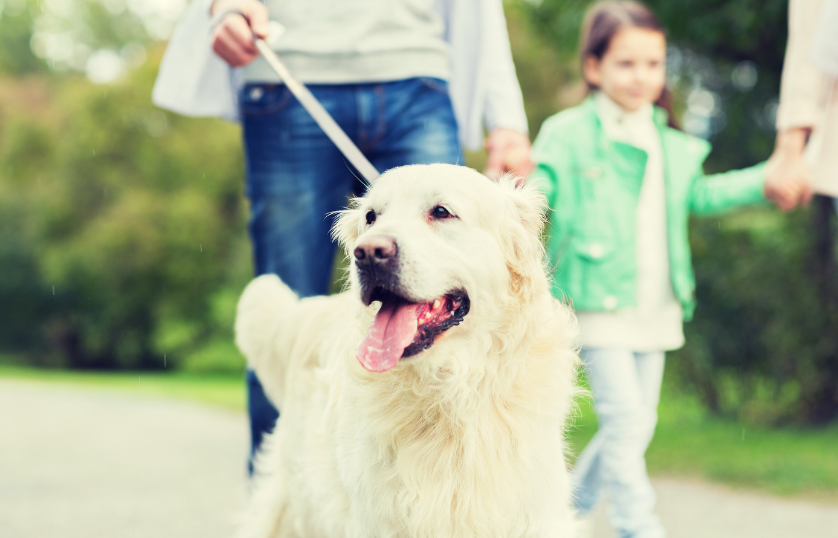Are Labrador retrievers Good Family Dogs? A Comprehensive Guide in 2024

Trustworthy, playful, hard-working , and always lovable, a Labrador retriever is one of the most prevalent dogs. But are Labrador retrievers good family dogs? Yes! Labrador Retrievers are great family dogs. They are highly adjustable and can fit into several living conditions, whether you live in a household with a big yard or a small apartment. They are also good with kids and make wonderful friends for children of all ages.
However, it’s significant to note that Labs need a lot of exercise and care to keep them happy as well as healthy. They are an active and require many opportunities to run, play, plus explore. Families who are eager to give their Labrador Retriever a lot of exercise and consideration will be happy with an affectionate and trustworthy companion who will rapidly become a beloved member of the household.
Research has shown that Labrador Retrievers’ personality traits are more influenced by their working status, with gundogs showing higher scores for fetching tendency and trainability than showdogs or pets.
Table of Contents
History and Origin of Labrador retriever
A Lab originated in Newfoundland, Canada, where these dogs were utilized by fishermen to rescue fish that had run-away from nets. They were used to pull farm carts loaded with fish and additional supplies. In 1800s, these dogs were carried to England by British immigrants, where they were further developed.
The AKC officially recognized a Labrador Retriever in 1917, and it has become one of the most prevalent dog breeds in the USA. Labrador Retrievers are recognized for their welcoming and outgoing temperaments, and their cleverness and trainability. They are frequently utilized as therapy dogs, family dogs, as well as service pets.
Physical Characteristics

Labradors are medium to large-sized canines that have a robust, muscular body. They are famous for their athletic and active bodies that make them outstanding swimmers, plus retrievers. Here are some physical characteristics of Labs.
Size and Weight
Labradors are usually 21.5-24.5 inches tall at the shoulder and weigh around 55-80 pounds. Males are usually larger than females.
Coat Colors
Labrador Retrievers are available in three colors: yellow, black, as well as chocolate. Some Labradors may also hold a white mark on their chest. These dogs have a double fur with a short, dense upper coat and a soft, thick basecoat. This fur protects them from cold water and aids them keep warm in cold season.
Distinct Features
Labradors have a unique otter tail that is thick as well as powerful. They also contain webbed feet that support them swim effectively. Their fur is water-resistant, which makes them perfect for duck hunting.
Variations
There are two categories of Labs: American and English. American Labrador retrievers are taller and lankier, whereas English Labrador retrievers are heavier as well as thicker. There are similarly field-bred as well as show-bred Labradors. Field-bred Labrador retrievers are more athletic and robust, whereas show-bred Labrador retrievers are more mellow and easy-going.
Personality and Temperament
Labrador Retrievers are recognized for their welcoming, outgoing, and robust personalities. They are nice, even-tempered, and affectionate dogs that make excellent family dogs. Labrador retrievers are highly social and like spending time with their beloved ones and other dogs.
Their loving nature makes them outstanding companions for kids and adults alike. They are tolerant of young kids and are known to be kind with them. Labradors are also trainable and keen to please, which makes them excellent dogs for obedience training, plus other activities.
Lab dogs are highly active canines that need a lot of exercise and mental encouragement to stay happy. They are recognized for their love of water and like swimming in the water. Lab dogs also adore to retrieve, and playing fetch is a good way to give them exercise and mental encouragement.
Training and Obedience

Training and obedience are essential for any dog, particularly for Labradors who are recognized for their liveliness as well as high energy levels. Labs are trainable and excited to please, making them outstanding dogs for obedience training.
1. Labrador Puppy Training
Puppy training is necessary for a Lab puppy to grow up as an obedient dog. It is significant to start training in the early age and to be steady with the training. Positive reinforcement, like treats and admiration, is an effective technique for training a Lab puppy.
Labrador Retriever pups are famous for their chewing and biting behaviors, which can be vicious if not fixed early on. It is vital to provide suitable puppy chew toys and redirect their behavior towards chew toys.
2. Obedience Training
Obedience training is significant for a Labrador Retriever to become a good family dog. Labradors are smart and alert, making them easy to train. Regularity and positive reinforcement are important to positive obedience training.
Labradors need mental inspiration, and obedience training can give them the mental work they require. It is vital to retain training sessions short and exciting to keep them involved and interested.
Exercise and Activity Level
Labradors are a high-energy dogs that need a lot of exercise and playtime to become healthy and happy. They are recognized for their affection of swimming and will spend many hours in the water if provided with the chance. Along with swimming, Labradors also like playing fetch and other sports that include running as well as chasing.
It is suggested that adult Labradors get at least 60 minutes of exercise regularly to maintain their physical and psychological health. This can be done through activities like walks, runs, hikes, plus playtime in a yard or dog park.
It is significant to note that Labradors can be predisposed to exercise-induced collapse, a situation in which the dog gets weak and awkward after intense exercise. This is very common in Lab dogs with a genetic mutation, therefore it is essential to be aware of your lab’s limits and not push them excessively hard throughout exercise.
Health & Wellbeing

As Labradors do have such a healthy hunger, it’s vital to control their diet. They must have at least half an hour walking or play daily. Labradors have a life expectancy of around 12 to 16 years.
Some health problems that they might come are Hip and Elbow issues as well as eye conditions. Trustworthy breeders have worked hard for many years to reduce the risk of these health problems.
Labrador breeders registered with AKC or an affiliated body must have breeding dogs x-rayed and evaluated for Hip as well as Elbow Dysplasia, before they record a litter. They must have Eye Clearance Certificates. It’s significant to check Lab breeders are registered. Several health problems can be avoided or decreased by keeping maintaining their weight. Talk to your Vets for extra health information.
Grooming
Labrador retrievers have a great weather-resistant coat. Thus, with a balanced diet they should only require two or three grooming sessions a week. Excessive washing using soap-based shampoos will eliminate the coat natural oils. Labs do shed their fur heavily during the year though, therefore brush them frequently to keep flyways controlled.
So, are Labrador retrievers good family dogs?
There’s more to consider once getting a new pooch, and whether a Lab is the right pooch for you.
First think about the physical space, exercise, and time that a Labrador require
A family with a large lawn might suit a Lab dog well, but someone having a busy life in an apartment can struggle. Are you anywhere with many dog parks, open spaces, as well as things for active dogs to do?
Always ponder the financial side of things as well
Labrador retrievers can easily live for around 10 years or more, therefore are you financially capable of caring them their entire life? Insurance is always suggested to keep these prices down.
Then consider their suitability to your family
Keep in mind that even though Labs are recognized to be loving and caring, and frequently good with kids, this will differ from dog to dog – does that specific Labrador suit your family’s routine? Are you seeking a companion, a family dog, a working pooch or one for sport? Labs might suit all of these jobs.
Finally, consider their health
Once more, not all Labs will get every ailment listed above. You can reduce the risk of genetic illnesses by having a crossbred Labrador, or buying a dog from a Lab breeder who has accomplished genetic testing on the breeding dogs.
As always, we do inspire you to adopt puppies from shelters first. Consistent check-ups by a vet are vital to make sure your dog is rising well, any diseases or health issues are detected early, and treatment can start.
Many of the above ailments have better consequences when recognized early. Once more, insurance will cover the charges of veterinary care. Be ready for at least one long-lasting disease, particularly in later life.
Why are Labrador retrievers Great Family Dogs? 10 Reasons

Labrador retrievers are one of the most adorable and playful dogs in this world, and they are recognized for being extremely great with kids. Obviously, Labradors are also very energetic and bouncy packs of fur, which might clarify why they are a perfect match for young children. These adorable dogs are also very trustworthy and relaxed; however, won’t hesitate to stand attentive when required, making them outstanding guard dogs.
Here are 10 reasons why a Lab dog is a great family dog:
- A Labrador is full of vigor, making him the vital doggy playmate.
- A Labrador is very affectionate and friendly.
- A Labrador is also very peaceful, making him tolerant of young kids.
- A Lab is family-oriented and likes being included in his human pack.
- A Labrador is trustworthy to his family, and even though not aggressive, will stay watchful like a faithful and enthusiastic guard.
- A Labrador is very tolerant and calm.
- A Lab dog has a high verge for activity, and can sustain the most active of kids.
- A Labrador is keen to please and easily trainable.
What are pros and cons of owing a Labrador?
Pros
- Adaptable: Labs are adjustable dogs that can live in several environments, including apartments as well as houses with lawns. They are also excellent with kids and other dogs.
- High-energy: Labs are high-energy canines that love to play as well as exercise. They are great friends for active families who relish outdoor activities.
- Tolerance: Labradors are tolerant dogs that are good with kids. They are kind and easy-going, making them excellent house pets.
- Intelligent: Labs are intelligent pooches that are easily trainable. They are rapid learners and outshine in obedience training.
- Usually healthy: Labradors are usually healthy dogs. Liable breeders will screen for problems like hip dysplasia and elbow problems. Heart illnesses, muscle weakness, and eye disorders can occur in this dog at times too.
Cons
- Destructive: Lab dogs can be destructive if they are not given sufficient exercise and mental encouragement. They might dig, chew, or destroy your furniture if they are tired or left alone for a longer period.
- Shedding: Lab dogs are heavy shedders and need regular grooming to retain their coats shiny.
- High-energy: Although their high-energy can be a pro, but it can also be a disadvantage for families who cannot provide adequate exercise and mental inspiration for their dog.
- Need for tolerance: Even though Labradors are tolerant dogs, but they can be stubborn at times. Owners have to be patient and steady with their training to achieve the best results.
FAQs
Are Labrador retrievers excellent house dogs?
Labs are very friendly. They are sociable house pets who bond with the entire family, and they hang out well with neighbor dogs as well as humans alike.
Are Labrador retrievers high maintenance dogs?
Labs are not usually high maintenance. However, they do shed a lot, and it is recommended to brush your dog daily. To sustain their oral health, brush their teeth two times a week. Cut their nails once a month, based on the requirement.
Conclusion
In summary, Labradors are usually very suited to a wide range of families and make great family pets. So, always do your research, get to know the every dog before you decide, preferably, to see if they fir your lifestyle, do your best to provide them with a positive rearing to avoid behavioral problems, and be aware of the expected diseases Labrador retrievers are likely to get.






